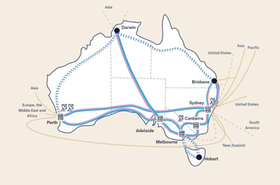Throughout history, the Levant has been a pivotal trading hub, connecting two geographical trade powers, Europe and Asia. The Levant now serves as an important connection between the same two powers but for a different purpose: subsea cables.
Data transmission across the globe relies on an extensive network of subsea and terrestrial cables, which connect the inhabitants of our planet to high-speed Internet, thereby enhancing the data consumption of Gen Z.
Data consumption is rising exponentially. According to Cisco's Annual Internet Report, between 2018 and 2023, data consumption increased by a whopping 82.43 percent and, with the advent of the cloud revolution a decade ago, this rate continues to increase year on year. Artificial intelligence (AI) is poised to grow at rapid rates, which means that we could potentially even exceed current data consumption levels. According to a McKinsey survey, the adoption of AI has more than doubled since 2017.
Historically, subsea cables have traversed Egypt, serving as the regional connection point from the Mediterranean through the Suez Canal, down to the Red Sea, and onwards to Asia. This route has seen a “chokehold,” with a whopping 17 percent of global data moving through the region, according to DCD.
Recent geopolitical changes in the region, particularly the Abraham Accords (the normalization agreements between the UAE, Bahrain, Morocco, and other MENA nations) signed in 2021, have ushered in a new political and economic era. These accords have paved the way for cross-country collaboration and enabled the establishment of new cable routes crossing the Levant, extending through Saudi Arabia, the UAE, and Oman to the Indian Ocean on to Asia.
There are eight new subsea projects due to come online in the region this decade. That represents a wealth of new opportunities for the region, creating additional connection points and complementing the existing Suez route, rendering the region one of the most active cable intersections globally. Cities such as Tel Aviv, which is where our newest data center Project Alpha will be located, are going to become vital hubs on new routes.
The data center industry is thriving in the Levant amidst the burgeoning networking opportunities in the region. The Middle East data center market is projected to grow from $3.2 billion in 2021 to $6.7 billion by 2027, according to a forecast from JLL. Demand for capacity is increasing, and new hyperscale data centers are under construction, with the arrival of the likes of AWS, Oracle, and Google. The region has emerged as an entrepreneurial powerhouse and a hub for innovative technologies, rapidly transforming the global corporate landscape and continuously generating new opportunities.
The Levant region's historical role as a crucial trade hub continues in the digital age through its strategic positioning in the subsea cable industry. The exponential rise in global data consumption, driven by advancements in cloud technology and artificial intelligence, underscores the importance of robust and diverse data transmission routes. With new subsea cable routes that enhance connectivity and complement the traditional Suez Canal pathway, this is an incredibly exciting moment for the region, provided it seizes the moment.




